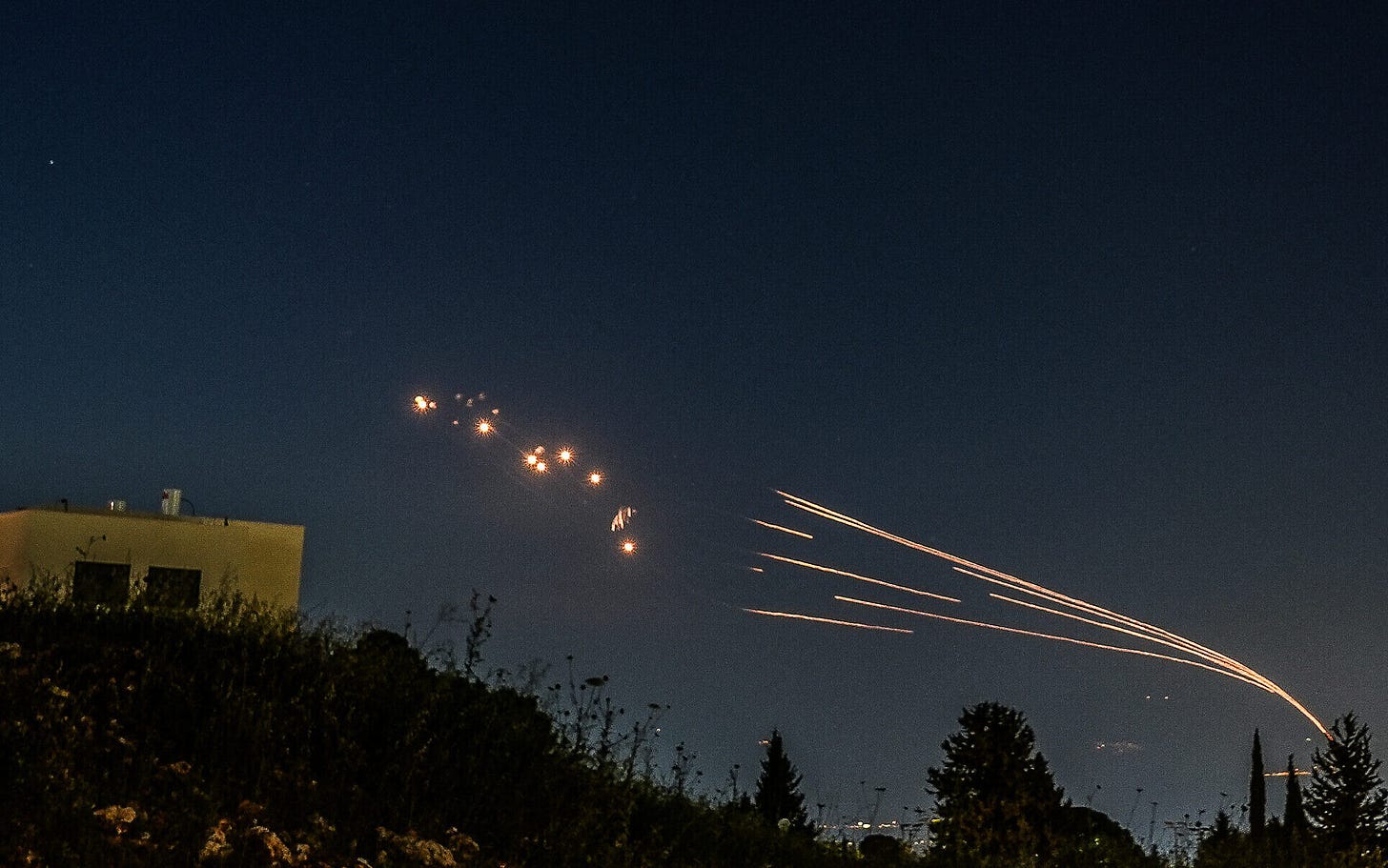Is Israel Gaining the Upper Hand in the Middle East?
Almost a year since the October 7 shock, its enemies are in trouble.
Hizballah launches explosive-laden drones, dozens of rockets at Israel. (The Times of Israel)
On October 7, 2023—almost a year ago—Israel awoke from a delusive dream into a severe nightmare. As Israeli intelligence and security expert Yossi Kuperwasser put it, “Oct. 7 proved that containment doesn’t work, that the old way of doing things is over, and that it’s time to be more aggressive.... The lesson of Oct. 7 is that Israel cannot tolerate heavily armed radical Islamists on its borders, even if they stay quiet for years. They must be destroyed, preemptively if necessary.”
He went on to say, “I have to admit...what was the alternative: a preemptive Israeli invasion and regime change in the Gaza Strip? No one would have supported such a thing before Oct. 7.”
He’s right, of course: even after October 7, Israel hasn’t had the easiest time gaining legitimacy for its war on Hamas—from a hypercritical US administration, from reflexive UN and European critics and a hostile media, from kangaroo courts in The Hague, let alone from a worldwide antisemitic movement thrilled and energized by the massacre.
Still, the lesson is learned: Israel cannot tolerate heavily armed radical Islamists on its borders, and cannot, again, more or less passively allow such a situation to develop in the future.
And what of the situation today, almost a year since the traumatic event?
1. Israel has defeated Hamas militarily. From a coherent fighting force of perhaps 30,000 on October 6, it has declined to a ragtag group of a few thousand guerrilla fighters with no clear command structure. Most of its top leaders—within Gaza, Marwan Issa and Muhammad Deif; outside of Gaza, Salah al-Aruri and Ismail Haniyeh—are dead, along with scores of high- and middle-level commanders. Its number-one leader within Gaza, Yahya Sinwar, is said to be unreachable for weeks and quite possibly dead. Rocket fire from Gaza has declined drastically; all of the recent, intermittent rockets have been intercepted or missed their targets.
Hamas still holds 50 to 60 living Israeli hostages in Gaza and is still sporadically able to inflict casualties on Israeli forces. Its remaining political power stems from its commandeering of food and other aid supplies and ability to dispense the supplies to the population at inflated prices—a problem Israel is now looking for ways to solve. But if Israel avoids errors like a premature withdrawal from Gaza, Hamas will remain soundly defeated.
2. Israel is on the way to defeating Hizballah militarily. Since Defense Minister Yoav Gallant announced on September 18 that “the center of gravity [of the fighting] is moving north”—that is, from Gaza to Lebanon—Hizballah has been hit, within a single week, by the stunning and unprecedented pager and walkie-talkie attacks, the elimination of its second-in-command Ibrahim Akil and almost the entire top brass of his Radwan force in the midst an underground parley in Beirut, and the wounding or killing of at least two additional major commanders in supposedly safe confines in Beirut. Tens of thousands of Hizballah’s missiles, rockets, and drones have been destroyed, and continue to be destroyed in Israeli airstrikes.
Hizballah leader Hassan Nasrallah has reportedly turned to Iran for help. But with powerful American (and Israeli) military assets in the region, and in light of Iran’s own domestic crisis, Iranian military action on Hizballah’s behalf is seriously in doubt. Meanwhile Hizballah is still able to fire projectiles at Israel that are causing disruption and anxiety, damage, and casualties. In the likely ensuing ground war in southern Lebanon, Hizballah will also be able to inflict casualties—but will be driven back across the Litani River in the end. Overall, Israel’s decisive intelligence and military superiority to Hizballah is clearly evident and will lead it to victory against the Shiite terror group.
In addition to Israel’s military success against Hamas and Hizballah, recent events have included: Iran’s failed missile-and-drone attack on Israel on April 14; Israel’s small but intimidating counterstrike on an Iranian radar facility on April 19; Israel’s attack on power, oil, and fuel facilities in Yemen’s Hodeidah port on July 20, from which the Houthis’ port still has not recovered; and the abovementioned assassination of Hamas leader Haniyeh on August 3 in the heart of Tehran—demonstrating, once again, that Israel’s intelligence proficiencies reach deep into Iran itself. This serial display of extraordinary military and intelligence prowess has not gone unnoticed in the region and among Israel’s enemies.
If this picture is generally accurate, with one of Iran’s proxies (Hamas) defeated and another (Hizballah) on the way to defeat, then one can say after almost a year that the October 7 attack, painful and horrific as it was, was a wakeup call to which Israel has responded successfully and effectively.
Update, September 29: Dramatic events since I posted this article on September 25—particularly, of course, the elimination by Israel on September 27 of the master terrorist and genocidist Hassan Nasrallah—further amplify the article’s view.






When President Bush forced Israel’s retreat from Gaza in 2005 for America’s bogus peace, Hurricane Katrina smacked us, sucker punched us from the South.
Today the experts see Hurricane Helene rapidly powering up to a Category 4 before striking just northwest of me.
Even God runs out of patience with arrogant, backstabbing, decadent, collapsing Empires who get in His way.
accuweather.com/en/hurricane/hurricane-…
From your lips to god’s ears